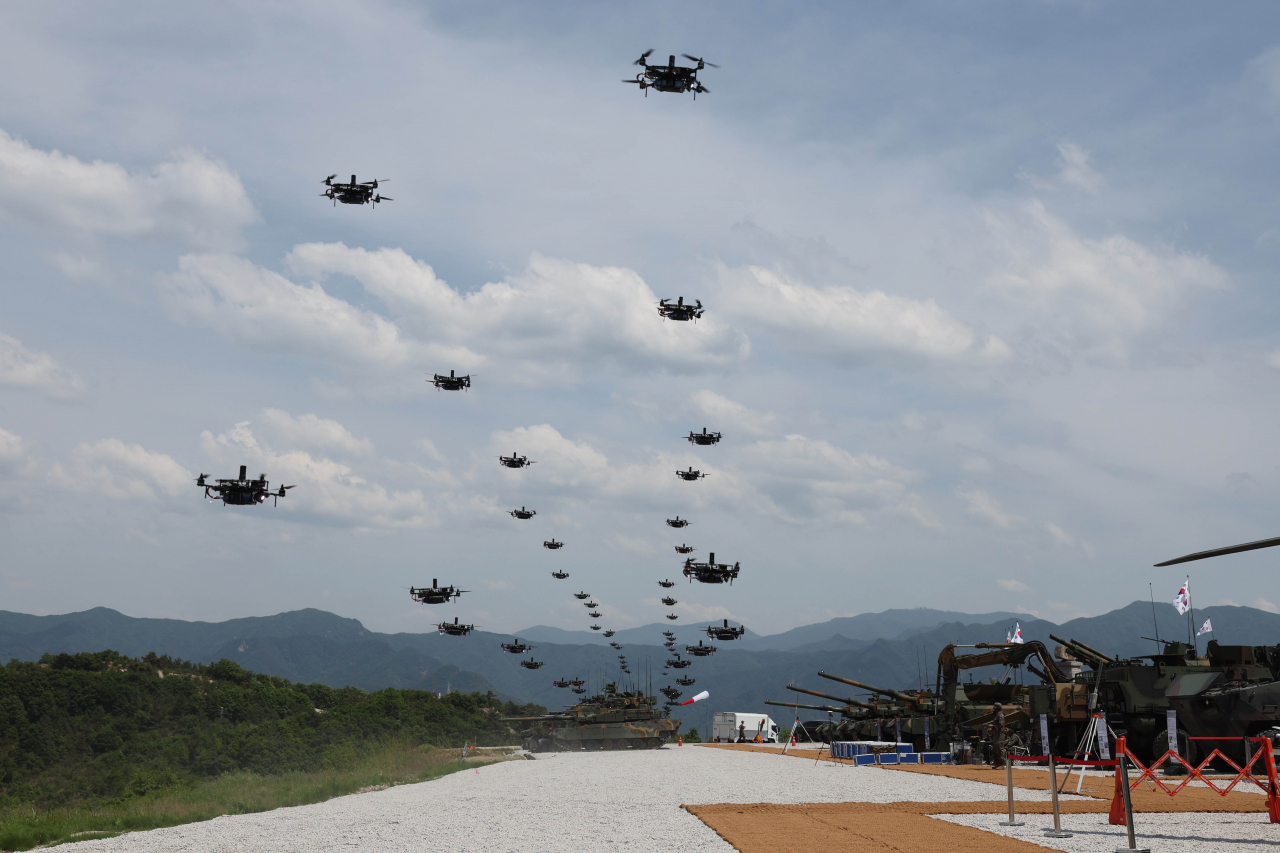S. Korea enacts drone operation law against NK infiltration
Drone command to be launched in September, headquarters location not decided
By Ji Da-gyumPublished : June 27, 2023 - 15:05

South Korea enacted a new law on Tuesday to establish a drone operations command aimed at conducting both defensive and offensive missions, including striking North Korean drones infiltrating South Korean airspace.
The law was proclaimed six months after President Yoon Suk Yeol's order to establish a drone operations command. The order was in response to an incident in which five North Korean drones intruded South Korean airspace, and flew over Seoul and the western inter-Korean border area on Dec. 26 last year.
The establishment of the drone operations command "aims to strengthen the military capabilities to respond aggressively to threats posed by aerial infiltration through drones and effectively carry out operations utilizing drones and support," the Ministry of Government Legislation explained in the law published in the country's official gazette on Tuesday.
South Korea is set to launch the drone operations command in September, with the command being under the supervision of the defense minister and led by a commander with a general-level rank. The law governing the command's operations will come into effect on Sept. 1.
"The Defense Ministry expects that the drone operations command will effectively and systematically carry out strategic and operational missions in the joint battlefield area through the utilization of drones and become a leading unit in advancing the development of drone operations," it said in a statement issued on Tuesday.
The ministry emphasized that the establishment of the drone operations command was essential due to the "evolving security landscape, which includes the infiltration of North Korean drones, the escalating threat of various provocations, and the expanding utilization of drone weapon systems in modern and future warfare."
The law offers the legal foundation for the establishment of the drone operations command and the implementation of its missions.
The command's primary responsibilities are the planning and execution of military operations using drones, the law says.
The military operations encompass "strategic and operational monitoring, reconnaissance, strikes, psychological warfare, electronic warfare, and other related activities," according to the law.
The final version of the law includes a new provision specifying that military operations will involve "detecting, tracking, and striking enemy unmanned aerial vehicles."
This is a notable addition to the draft law that was unveiled in April. The purpose of this added provision is to clarify that South Korea intends to use drones for both offensive and defensive missions, according to the Defense Ministry.
Another crucial mission of the command is to develop the combat capabilities of drone operations.
The South Korean military has adopted an aggressive counter-drone operational principle, whereby in response to a North Korean drone intrusion into South Korean airspace, South Korea will deploy at least 10 times as many drones toward North Korea as the number of intruding drones.
The Defense Ministry previously reiterated that South Korea has the "right to exercise self-defense," which allows for such a response against North Korea's airborne infiltration during a televised regular briefing on June 20.
South Korean Prime Minister Han Duck-soo also emphasized that the establishment of the drone operations command is a significant part of the government's efforts to "maintain a robust state of readiness, capable of overwhelmingly suppressing any provocations by North Korea" during a Cabinet meeting the same day.
The Defense Ministry has acquired drones powered by solar batteries, allowing them to perform long-range reconnaissance missions at high altitudes.
The ministry has plans to procure 100 small-scale drones -- which are capable of monitoring and conducting reconnaissance throughout North Korea -- by the end of this month.
By the end of this year, the South Korean government seeks to develop small stealthy drones specifically designed to avoid detection by North Korea's radar systems.
The drones will be designed to reach speeds of several hundred kilometers per hour while following pre-programmed routes and will be able to return to their designated location without control assistance.
But the South Korean military has not yet determined the location of the headquarters of the drone operations command.
The former base of the 6th Army Engineering Brigade in the city of Pocheon, Gyeonggi Province, has been suggested as a possible site for the drone command headquarters.
But some local residents have voiced their opposition to the proposal. In response to the concerns raised, the Pocheon City Council on Monday announced that it will conduct an opinion poll on the matter in early July.
The Defense Ministry on Tuesday said it will make sure to provide comprehensive explanations to address any concerns raised by the local residents.
"If the venue is confirmed, we will engage in discussions and consultations with the local government and various representatives," Jeon Ha-gyu, the ministry's spokesperson, said during a regular press briefing.
"We will make sure to launch the command in accordance with the appropriate procedures."




















